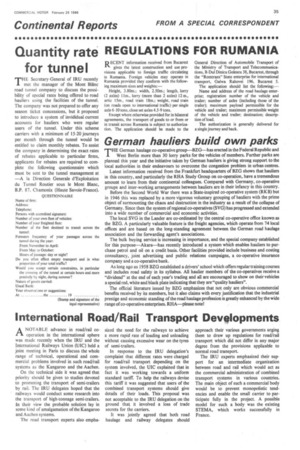German hauliers build own parks
Page 37

If you've noticed an error in this article please click here to report it so we can fix it.
THE German haulage co-operative group—BZG—has erected in the Federal Republic and West Berlin more than 30 lorry parks for the vehicles of members. Further parks are planned this year and the initiative taken by German hauliers is giving strong support to the local authorities in their endeavours to overcome the congestion problem in urban centres.
Latest information received from the Frankfurt headquarters of BZG shows that hauliers in this country, and particularly the RHA Study Group on co-operation, have a tremendous amount to learn from their continental colleagues. Compared with Germany, co-operative groups and inter-working arrangements between hauliers are in their infancy in this country.
Before the Second World War there was a State-inspired co-operative system (RKB) but in 1946 this was replaced by a more vigorous voluntary grouping of hauliers with the prime object of surmounting the chaos and destruction in the industry as a result of the collapse of Germany. Since then the system of regional co-operatives (SVG) has progressed and extended into a wide number of commercial and economic activities.
The local SVG in the Lander are co-ordinated by the central co-operative office known as the BZG. A particularly valuable feature is the freight agencies, which operate from 74 local offices and are based on the long-standing agreement between the German road haulage association and the forwarding agent's associations.
The bulk buying service is increasing in importance, and the special company established for this purpose—Akara—has recently introduced a system which enables hauliers to purchase petrol and oil on a credit basis. Other facilities provided include business and costing consultancy, joint advertising and public relations campaigns, a co-operative insurance company and a co-operative bank.
As long ago as 1958 BZG established a drivers' school which offers regular training courses and includes road safety in its syllabus. All haulier members of the co-operatives receive a "dividend" at the end of each year's trading and all are encouraged to show on their vehicles a special red, white and black plate indicating that they are "quality hauliers".
The official literature issued by BZG emphasizes that not only are obvious commercial benefits received by its members, but it also claims with every justification that the industrial prestige and economic standing of the road haulage profession is greatly enhanced by the wide range of co-operative enterprises. RHA—please notel




























































































































